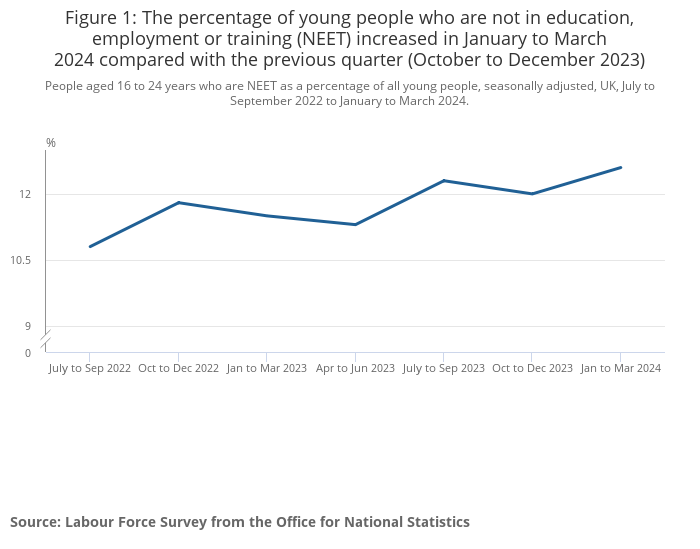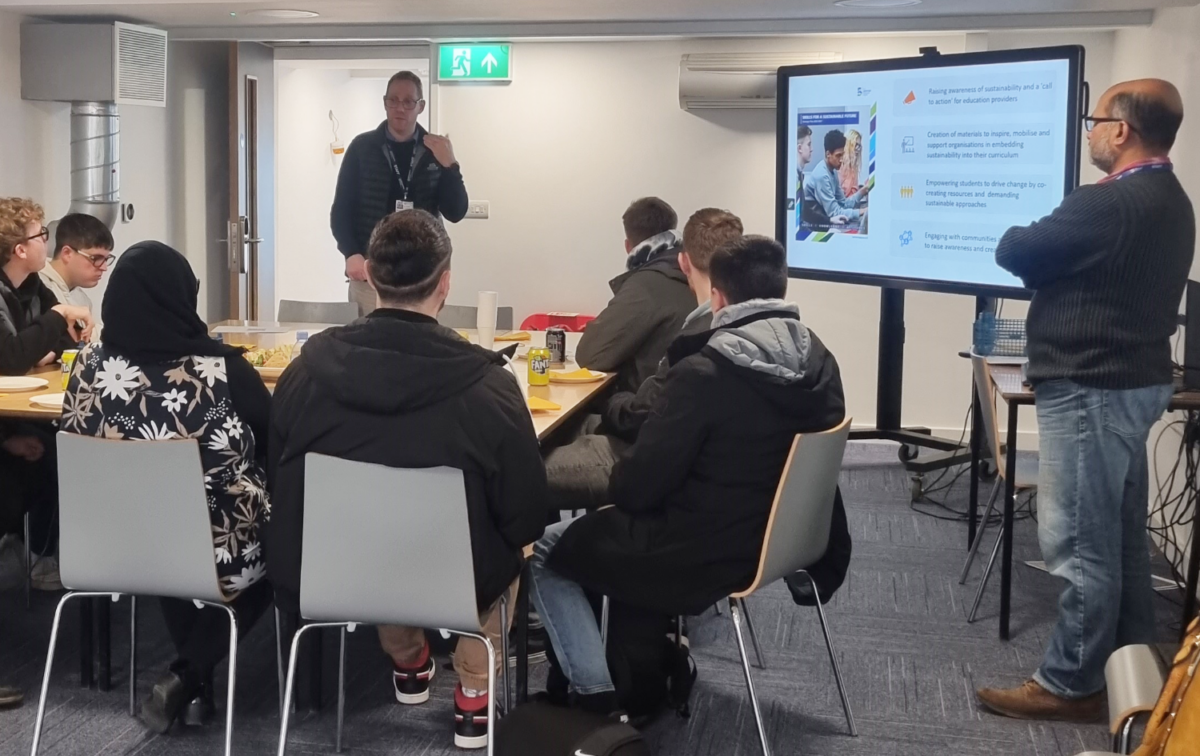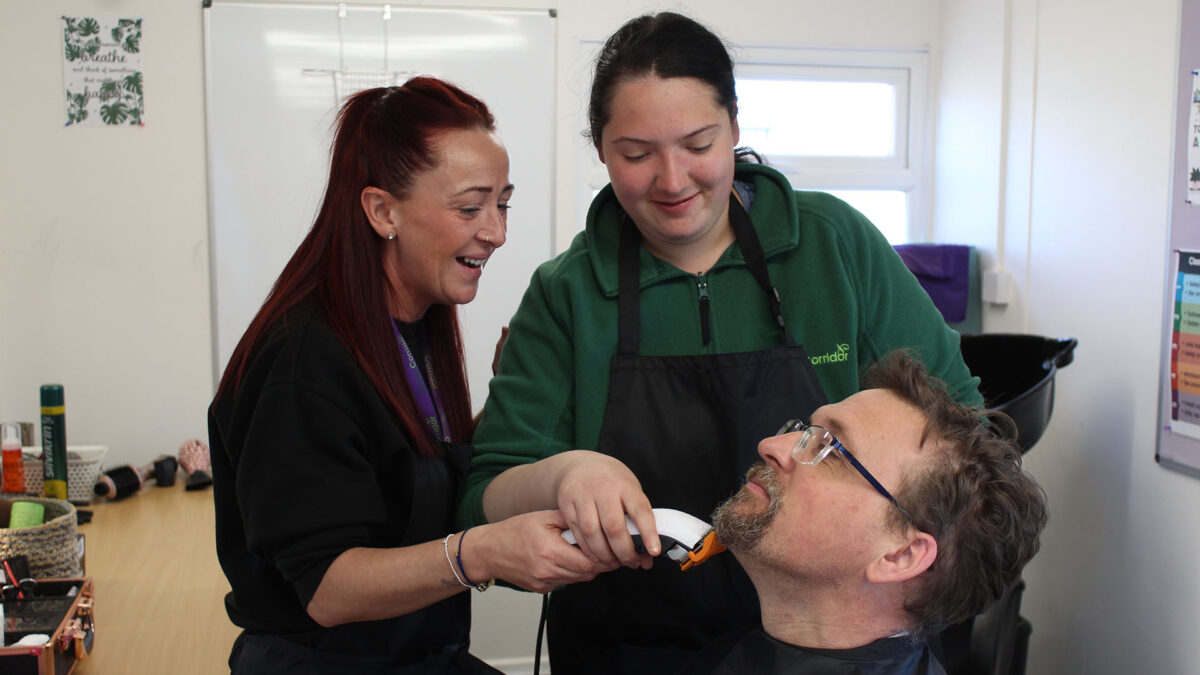Young people not in education, employment or training (NEET) – Sector Reaction

The Office for National Statistics launched the Labour Force Survey results today. This highlighted that there was an increase in NEETs from, January to March 2024, with the total currently estimated to be 900,000, up from 812,000 in January to March 2023. An estimated 12.6% of all people aged 16 to 24 years in the UK were not in education, employment or training (NEET) in January to March 2024. This is up 1.1 percentage points compared with January to March 2023, and up 0.6 percentage points on the previous quarter. An estimated 13.9% of young men (up 2.6 percentage points on the year) and 11.2% of young women (down 0.5 percentage points on the year) were NEET.
The results come out the day after Prime Minister Rishi Sunak announced the date of the General Election (4th July 2024).
1.Main points from the ONS Survey
- Labour Force Survey (LFS) estimates have been reweighted for periods from July to September 2022 onwards; a discontinuity has been introduced at this point, so comparisons before this point are not possible.
- Increased volatility of LFS estimates, resulting from smaller achieved sample sizes, means that estimates of quarterly change should be treated with additional caution.
- There was an increase in the number of young people aged 16 to 24 years not in education, employment or training (NEET) in January to March 2024, with the total currently estimated to be 900,000, up from 812,000 in January to March 2023.
- The percentage of all young people who were NEET in January to March 2024 was estimated at 12.6%, up 1.1 percentage points on January to March 2023.
- The increase in the number of young people who were NEET was driven by young men, with an increase of 99,000 on the year to 506,000 (January to March 2023).
- The number of young people who were NEET and unemployed in January to March 2024 was estimated to be 320,000, an increase of 11,000 on the year (January to March 2023).
- The number of young men aged 16 to 24 years who were NEET and unemployed increased by 17,000 on the year to 203,000.
- There were an estimated 580,000 young people in the UK who were NEET and economically inactive, an increase on the year of 77,000.
The ongoing challenges with response rates and levels mean that LFS-based labour market statistics will be badged as official statistics in development until further review.
2.Total young people who were not in education, employment or training
An estimated 12.6% of all people aged 16 to 24 years in the UK were not in education, employment or training (NEET) in January to March 2024. This is up 1.1 percentage points compared with January to March 2023, and up 0.6 percentage points on the previous quarter.
An estimated 13.9% of young men (up 2.6 percentage points on the year) and 11.2% of young women (down 0.5 percentage points on the year) were NEET. There were 900,000 young people who were NEET in total, an increase of 87,000 on the year. This increase was driven by young men. Of the total number of young people who were NEET, 506,000 were young men and 394,000 were young women.
The total number of people aged 18 to 24 years who were NEET was 829,000, up 74,000 on the previous year.
The percentage of those aged 18 to 24 years who were NEET was 15.0%, which was up 1.2 percentage points on the year, and up 0.8 percentage points on the quarter.

Unemployed young people who were not in education, employment or training
There were an estimated 320,000 NEET young people aged 16 to 24 years who were unemployed in January to March 2024, up 11,000 from January to March 2023 and up 27,000 from October to December 2023. An estimated 203,000 of these unemployed NEETS were young men, and 116,000 were young women. The number of NEET men aged 16 to 24 years who were unemployed increased by 17,000 on the year from January to March 2023, while the number of NEET women aged 16 to 24 years who were unemployed decreased by 6,000 on the year from January to March 2023.
Economically inactive young people who were not in education, employment or training
In January to March 2024, there were an estimated 580,000 economically inactive young people aged 16 to 24 years who were NEET. This was up 77,000 on the year from January to March 2023, and up 21,000 on the quarter from October to December 2023. The number of young men who were NEET and economically inactive was 302,000 and the corresponding number of young women was 278,000. This was driven by young men who saw an increase of 82,000 on the year from January to March 2023, while young women aged 16 to 24 years who were NEET and economically inactive decreased by 5,000 on the year from January to March 2023.
Sector Reaction to the NEET statistics from ONS
Faiza Khan MBE, Exec Director, Corporate Affairs and Foundation, City & Guilds said:
“We were saddened to see that new figures released by the ONS show that an estimated 12.6% of all people aged 16 to 24 years in the UK were not in education, employment, or training (NEET) from January to March 2024.
“This means that 900,000 young people are missing out on the opportunity to succeed and is impacting communities and families right across the country.
“We know that it is vital that young people are provided support to ensure they have opportunities for education and training from the key ages of 16 to 19, a period that is well documented in ensuring they have a better chance of staying in employment and maximising their potential for the rest of their lives.
“That is why at City and Guilds we are calling for a fresh approach to skills that takes account of both the national framework and the reality for learners locally. We know that skills are a key driver for growth and productivity and as such need to be seen as an investment for the future.
“Overcoming this means ensuring people can access education and training throughout their lives. We must make concerted efforts to support younger learners, while helping people at every career stage. If this country is truly committed to lifelong learning, then access to skills training must be available to all and at every age.”
Sam Avanzo Windett, L&W Deputy Director and Co-Chair of the Youth Employment Group:
“Today’s worrying statistics confirm that the numbers of young people not in education, employment or training continue to increase, with both unemployment and inactivity on the rise. That’s 900,000 young people left without a positive pathway to progress their education or careers. The election provides an opportunity for the next government to reverse these trends by putting in place a Young Person’s Guarantee for people under the age of 25 to receive support to access employment, training or education within four months of leaving employment or formal education. Given today’s figures, this isn’t a nice-to-have – it’s a must-have.”
Kate Shoesmith, REC Deputy Chief Executive, said:
“We need to help young people up their skills and widen their opportunities.
“We need to reform the apprenticeship levy if we are to help young people make the most of their talents. The longer the next government of any party leaves reform, the more people miss out unnecessarily and the tighter the labour market remains for employers. As of today, funds are only available to those who have the same employer for at least a year – which must shorten. Political parties must put a more flexible levy which supports shorter and more modular courses into their General Election manifestos and action it within their first one hundred days in government.
“And we want more collaboration between public and private sectors to help young people into jobs because it really works. Employers are keen to take every opportunity to hire young talent right now amid the current labour shortages. For example, recruiters are helping make the Restart scheme a success by matching out-of-work talent with employers. Our own award-winning Restart programme, which sees recruiters work with employability services provider Maximus, has helped place more than 2000 long-term unemployed people into work since 2021.”
TUC General Secretary Paul Nowak said:
“Being unemployed at the start of your career has a lifelong impact – and hits your earnings for the rest of your life.
“The UK must never allow mass youth unemployment to take hold and blight lives.
“We need real help now to get young people the chance to develop their skills and build their experience of paid work.
“And we need action to end the reliance on insecure precarious work that particularly affects young workers – every job should be a good job.
“The general election is a vital chance to reset our labour market.
“The New Deal for Working People will be a game changer for young workers.
“It will ban zero-hours contracts. It will end the use of fire and rehire to water down pay and conditions. And it will protect young workers from being unfairly sacked from their first day in the job.”
Defining the ONS data and terms:
Young people
For this release, young people are defined as those aged 16 to 24 years. Estimates are also produced for the age groups 16 to 17 years and 18 to 24 years by sex, and separately for the age groups 18 to 20 years, 21 to 22 years and 23 to 24 years.
Education and training
People are considered to be in education or training if they:
- are enrolled on an education course and are still attending or waiting for term to start or restart
- are doing an apprenticeship
- are on a government-supported employment or training programme
- are working or studying towards a qualification
- have had job-related training or education in the last four weeks
Young people not in education, employment or training
Anybody who is not in any of the forms of education or training listed in the Education and training section of this glossary, and who is not in employment is considered to be NEET. As a result, a person identified as NEET will always be either unemployed or economically inactive.
Economic inactivity
People not in the labour force (also known as economically inactive) are not in employment, but do not meet the internationally accepted definition of unemployment because they have not been seeking work within the last four weeks and/or they are unable to start work in the next two weeks.
Employment
Employment measures the number of people in paid work, or those who had a job that they were temporarily away from (for example, because they were on holiday or off sick). This differs from the number of jobs because some people have more than one job.
Unemployment
Unemployment measures people without a job who have been actively seeking work within the last four weeks and are available to start work within the next two weeks.
Measuring the data on Neets
This statistical bulletin from ONS contains estimates for young people who were not in education, employment or training (NEET) in the UK. The bulletin is published quarterly in February or March, May, August and November. All estimates discussed in this statistical bulletin are for the UK and are seasonally adjusted.
Statistics in this bulletin are used to help monitor progress towards the Sustainable Development Goals (SDGs). Explore the UK Government’s data on the SDGs reporting platform.
The ONS NEET methodology provides background information about how missing information for identifying someone as NEET is appropriated based on individual characteristics.











Responses